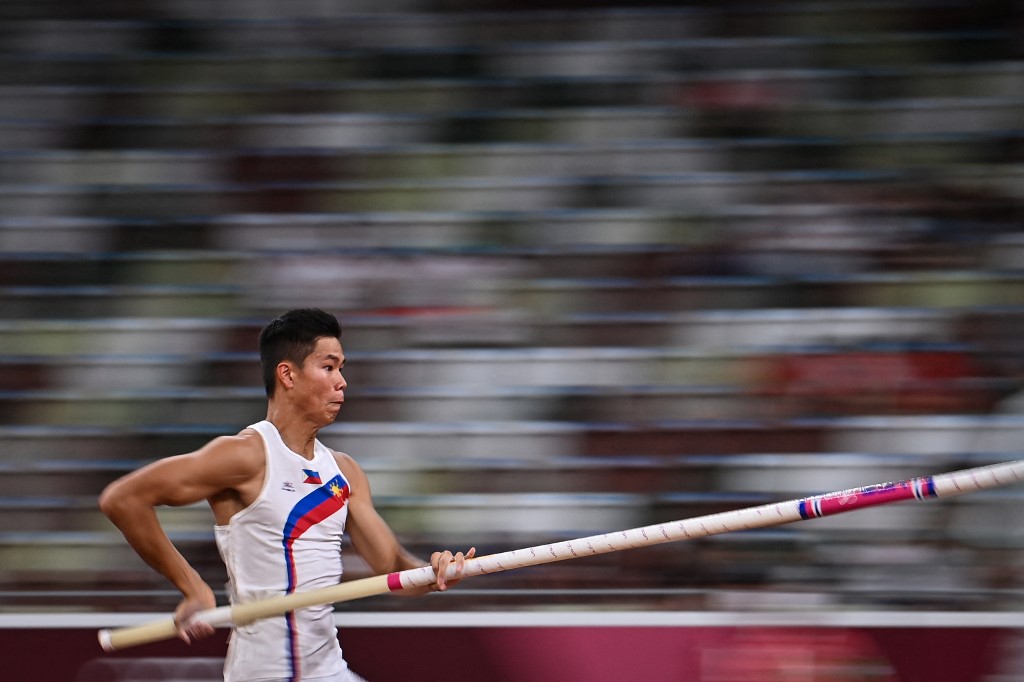
EJ Obiena (left) will still vault for the Philippines, the Philippine Olympic Committee says. AFP FILE PHOTO
From now on, athletics chief Philip “Popoy” Ella Juico will be barred from attending all Philippine Olympic Committee (POC) functions.
But the Philippine Athletics Track and Field Association (Patafa) president couldn’t care less.
The local Olympic body on Tuesday declared Juico persona non grata as a result of the harassment complaint filed by national pole vault ace Ernest John Obiena against him.
POC president Rep. Abraham “Bambol” Tolentino said the POC executive board approved the recommendation of its ethics committee where Obiena’s case against the Patafa head was heard.
“We are not removing him (Juico) as president of Patafa, and neither are we suspending him. We just don’t recognize him as Patafa president,” said Tolentino.
Juico, meanwhile, said that he is not worried at what had just developed on the case that started when he and his association asked Obiena to return 85,000 euros (over P4.8 million) in salaries that the athlete did not pay his Ukranian coach, Vitaly Petrov, on time.
Amazed more than anything
“I am more amazed at how people can just ignore objective facts and truth,” Juico told the Inquirer through a text message. “No, [I am] not worried.”
Tolentino said that not recognizing Juico doesn’t mean that the POC will not acknowledge the Patafa.
“We do recognize the Patafa as an NSA (national sports association) under the POC. Patafa can still do its daily businesses with the POC,” added Tolentino, who beat Juico and his group for the POC presidency.
The POC ethics committee chaired by rowing president Pato Gregorio signed the decision recommending that Juico be declared persona non grata and therefore not to be recognized as Patafa president until a new track and field head has been duly elected.
Tolentino also basically opened the doors for Obiena to compete again internationally, declaring that “If Patafa won’t endorse him, which I doubt they would, then we (POC) will.”
The ethics committee, with POC chief legal officer lawyer Wharton Chan helping out, charged Juico of “not adhering to POC’s aim of uplifting the level of performance of Filipino athletes in international competitions and for committing acts not necessary for the proper accomplishment of the purposes of the POC.”
Juico also said that he still has to see the official POC statement but emphasized that “this is an issue which the Commission on Audit (COA) would be very interested in.”
The COA has the power to be part of this whole brouhaha since it is people’s money that is in question.
In his complaint before the committee, Obiena said Juico “maliciously accused him of squandering government funds intended for his Ukranian coach Vitaly Petrov and acted in a reckless manner treating him like a criminal without any proper investigation.”
Tolentino said Juico was afforded due process in a clarificatory meeting the latter attended. Both parties were also requested to submit their position papers prior to the verdict of the ethics committee.
“He (Juico) said the POC has no jurisdiction on the Patafa’s problem with EJ. He waived his right and we have to decide,” said Tolentino.
The approval of the POC executive board will be presented to the POC general assembly early next month where the 50 voting NSAs will ratify the decision.
Second time
Another Patafa president, Go Teng Kok, was also declared persona non grata in 2011 during the term of Jose “Peping” Cojuangco Jr.
At that time, the POC disowned Go for violating its constitution and bylaws by going to court to stop the POC from recognizing newly installed Philippine Karatedo Federation president Enrico Vasquez.
Juico eventually took over as Patafa president after Go decided to retire for good. Juico won unopposed and continues to have the full backing of his board.
“This is an extraordinary case. We are dealing with an Olympian, a world-class athlete with a bright future,” said Tolentino.
According to Tolentino, 11 out of 14 members of the executive board voted for the ethics committee recommendation. International Olympic Committee executive board member Mikee Cojuangco-Jaworski and POC board member Charlie Ho abstained, while POC chair Steve Hontiveros didn’t attend the meeting.
The rift between the NSA for track and field and its superstar athlete stemmed from Obiena’s late disbursement of salaries to his Ukranian coach Vitaly Petrov while they trained in Formia, Italy, in preparation for the Tokyo Olympics.
The Patafa asked the prized pole vaulter to return 85,000 euros (over P4.8 million), which represented a major chunk of Petrov’s salary since 2018.
Obiena snapped back at Patafa, pointing out that he had already settled the financial obligation to Petrov in full after three payments made last month and emphasized that not paying his coach on time is not a crime.
Petrov backed Obiena by issuing an official statement in a hastily-called press conference arranged by Obiena, pointing out that the Ukrainian mentor had already received the entire amount.
Obiena demanded a full withdrawal of the investigation, a full public apology from Patafa authorities, and threatened to retire from the sport.